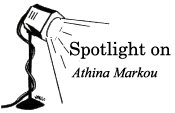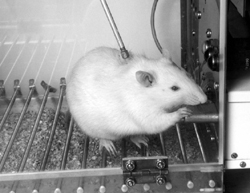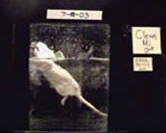
Athina Markou works in the Dept. of Neuropharmacology at Scripps in California.
Markou finds it interesting that people suffering from depression are more likely to smoke, and that people trying to quit smoking often become depressed. Unfortunately, instead of directly addressing human drug abuse, Markou has spent years and millions of dollars addicting hundreds of rats to nicotine, cocaine, morphine and other drugs.
In
2003, Markou published the results of a study of nicotine withdrawal that
used 149 rats.![]() Electrodes were screwed into the skulls of rats, and tiny pumps were implanted
under the animal's skin. The pumps released a nicotine solution that resulted
in levels in the rats “equivalent to those produced in a human who
smokes 30 cigarettes per day.” After the rats became dependent upon
nicotine, the pumps were removed and the rats were observed for signs
of “withdrawal-like depression.”
Electrodes were screwed into the skulls of rats, and tiny pumps were implanted
under the animal's skin. The pumps released a nicotine solution that resulted
in levels in the rats “equivalent to those produced in a human who
smokes 30 cigarettes per day.” After the rats became dependent upon
nicotine, the pumps were removed and the rats were observed for signs
of “withdrawal-like depression.”
Markou and researchers from Novartis are currently collaborating on a project to develop new drugs to treat depression and nicotine addiction. The project, using mice and rats, will test the effects of new drugs by using a number of different tests, including the “Forced Swim Test,” “Tail Suspension” and “Olfactory Bulbectomy.”
![]()
• The forced swim test is a cruel but common method used by animal researchers to study depression. Animals are placed in water and monitored until they stop attempting to swim or climb out of the tank; this immobility is considered a “despair condition.” (When animals are given antidepressants, they sometimes spend more time swimming.)
• In the tail suspension test, mice or rats are suspended by their tails; when the animal becomes motionless, he or she is considered to be in a depressive-like state.
•
The removal of the olfactory bulb (which disturbs an animal's
sense of smell) causes “behavioral abnormalities,” such as hyperactivity,
in rats.


 |